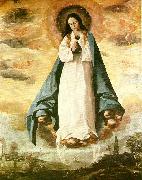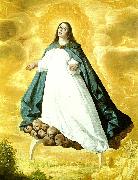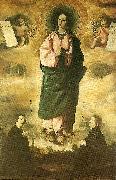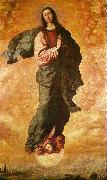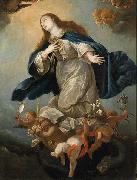Wholesale Oil Painting No Minimum |
|||||||||||
|
|
|||||||||||

|
|||||||||||
|
|
|
||||||||
Francisco de Zurbaran1598-1664 Spanish Francisco de Zurbaran Galleries Spanish baroque painter, active mainly at Llerena, Madrid, and Seville. He worked mostly for ecclesiastical patrons. His early paintings, including Crucifixion (1627; Art Inst., Chicago), St. Michael (Metropolitan Mus.), and St. Francis (City Art Museum, St. Louis), often suggest the austere simplicity of wooden sculpture. The figures, placed close to the picture surface, are strongly modeled in dramatic light against dark backgrounds, indicating the influence of Caravaggio. They were clearly painted as altarpieces or devotional objects. In the 1630s the realistic style seen in his famous Apotheosis of St. Thomas Aquinas (1631; Seville) yields to a more mystical expression in works such as the Adoration of the Shepherds (1638; Grenoble); in this decade he was influenced by Ribera figural types and rapid brushwork. While in Seville, Zurbur??n was clearly influenced by Velazquez. After c.1640 the simple power of Zurbaran work lessened as Murillo influence on his painting increased (e.g., Virgin and Child with St. John, Fine Arts Gall., San Diego, Calif.). There are works by Zurbar??n in the Hispanic Society of America, New York City; the National Gallery, Washington, D.C.; and the Philadelphia Museum of Art.. |
||||||||
|
|
||||||||
immaculate virgin
immaculate virgin Painting ID:: 65617 |
1630
oil on canvas, 174x138cm
se 1630 oil on canvas, 174x138cm se |
|||||||
|
|
||||||||
Francisco de Zurbaran1598-1664 Spanish Francisco de Zurbaran Galleries Spanish baroque painter, active mainly at Llerena, Madrid, and Seville. He worked mostly for ecclesiastical patrons. His early paintings, including Crucifixion (1627; Art Inst., Chicago), St. Michael (Metropolitan Mus.), and St. Francis (City Art Museum, St. Louis), often suggest the austere simplicity of wooden sculpture. The figures, placed close to the picture surface, are strongly modeled in dramatic light against dark backgrounds, indicating the influence of Caravaggio. They were clearly painted as altarpieces or devotional objects. In the 1630s the realistic style seen in his famous Apotheosis of St. Thomas Aquinas (1631; Seville) yields to a more mystical expression in works such as the Adoration of the Shepherds (1638; Grenoble); in this decade he was influenced by Ribera figural types and rapid brushwork. While in Seville, Zurbur??n was clearly influenced by Velazquez. After c.1640 the simple power of Zurbaran work lessened as Murillo influence on his painting increased (e.g., Virgin and Child with St. John, Fine Arts Gall., San Diego, Calif.). There are works by Zurbar??n in the Hispanic Society of America, New York City; the National Gallery, Washington, D.C.; and the Philadelphia Museum of Art.. |
||||||||
|
|
||||||||
|
|
immaculate virgin
immaculate virgin Painting ID:: 65625 |
1625-1630
oil on canvas, 100x75cm
se 1625-1630 oil on canvas, 100x75cm se |
||||||
|
|
||||||||
Francisco de Zurbaran1598-1664 Spanish Francisco de Zurbaran Galleries Spanish baroque painter, active mainly at Llerena, Madrid, and Seville. He worked mostly for ecclesiastical patrons. His early paintings, including Crucifixion (1627; Art Inst., Chicago), St. Michael (Metropolitan Mus.), and St. Francis (City Art Museum, St. Louis), often suggest the austere simplicity of wooden sculpture. The figures, placed close to the picture surface, are strongly modeled in dramatic light against dark backgrounds, indicating the influence of Caravaggio. They were clearly painted as altarpieces or devotional objects. In the 1630s the realistic style seen in his famous Apotheosis of St. Thomas Aquinas (1631; Seville) yields to a more mystical expression in works such as the Adoration of the Shepherds (1638; Grenoble); in this decade he was influenced by Ribera figural types and rapid brushwork. While in Seville, Zurbur??n was clearly influenced by Velazquez. After c.1640 the simple power of Zurbaran work lessened as Murillo influence on his painting increased (e.g., Virgin and Child with St. John, Fine Arts Gall., San Diego, Calif.). There are works by Zurbar??n in the Hispanic Society of America, New York City; the National Gallery, Washington, D.C.; and the Philadelphia Museum of Art.. |
||||||||
|
|
||||||||
|
|
immaculate virgin
immaculate virgin Painting ID:: 65629 |
1632
oil on canvas, 252x168cm
se 1632 oil on canvas, 252x168cm se |
||||||
|
|
||||||||
Francisco de Zurbaran1598-1664 Spanish Francisco de Zurbaran Galleries Spanish baroque painter, active mainly at Llerena, Madrid, and Seville. He worked mostly for ecclesiastical patrons. His early paintings, including Crucifixion (1627; Art Inst., Chicago), St. Michael (Metropolitan Mus.), and St. Francis (City Art Museum, St. Louis), often suggest the austere simplicity of wooden sculpture. The figures, placed close to the picture surface, are strongly modeled in dramatic light against dark backgrounds, indicating the influence of Caravaggio. They were clearly painted as altarpieces or devotional objects. In the 1630s the realistic style seen in his famous Apotheosis of St. Thomas Aquinas (1631; Seville) yields to a more mystical expression in works such as the Adoration of the Shepherds (1638; Grenoble); in this decade he was influenced by Ribera figural types and rapid brushwork. While in Seville, Zurbur??n was clearly influenced by Velazquez. After c.1640 the simple power of Zurbaran work lessened as Murillo influence on his painting increased (e.g., Virgin and Child with St. John, Fine Arts Gall., San Diego, Calif.). There are works by Zurbar??n in the Hispanic Society of America, New York City; the National Gallery, Washington, D.C.; and the Philadelphia Museum of Art.. |
||||||||
|
|
||||||||
|
|
immaculate virgin
immaculate virgin Painting ID:: 65711 |
1641-1658
oil on canvas, 198x120cm
se 1641-1658 oil on canvas, 198x120cm se |
||||||
|
|
||||||||
Circle of Mateo Cerezo the Youngerpainted Immaculate Virgin, formerly in the Chapel of Palacio de Penaranda, Spain in 17th century |
||||||||
|
|
||||||||
|
|
Immaculate Virgin
Immaculate Virgin Painting ID:: 92279 |
188 x 130 cm
Date 17th century
cyf 188 x 130 cm Date 17th century cyf |
||||||
|
|
||||||||
|
Circle of Mateo Cerezo the Younger painted Immaculate Virgin, formerly in the Chapel of Palacio de Penaranda, Spain in 17th century Immaculate Virgin 188 x 130 cm Date 17th century cyf |
||||||||
|
|
||||||||
|
Prev Next
|
||||||||
|
|
||||||||
|
Related Paintings to Circle of Mateo Cerezo the Younger :. |
||||||||
|
|
||||||||
|
CONTACT US |
